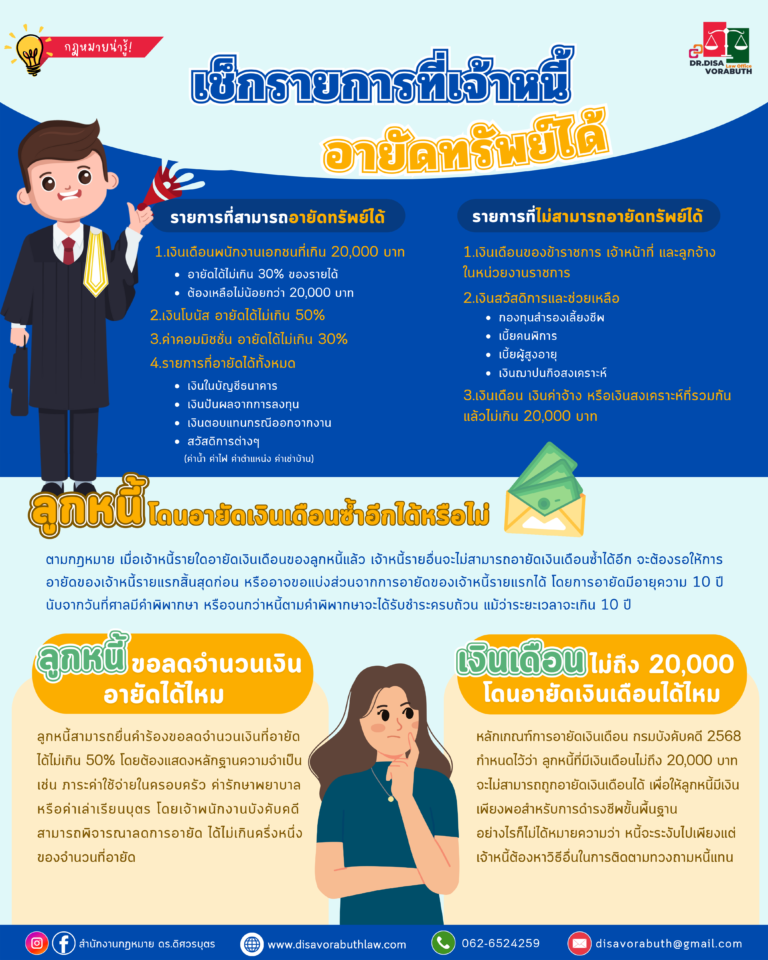Asset seizure and garnishment
The seizure of assets refers to the process where an enforcement officer takes action against the debtor’s assets based on a court judgment, sells them at a public auction, and uses the proceeds to pay off the creditor.
Garnishment refers to an order prohibiting the debtor or any related party from selling, transferring, or conducting any legal actions involving the seized assets or claims.
How much debt is required for asset seizure?
Debt must go through litigation and judgment
The creditor must file a lawsuit with the court, and the court must issue a judgment requiring the debtor to repay the debt.
If the debtor fails to comply with the judgment, the creditor can request the Legal Execution Department to seize the debtor’s assets.Minimum debt amount for asset seizure
There is no fixed minimum amount for asset seizure. However, generally, if the debt is substantial (in the hundreds of thousands or more) and remains unpaid, the court may order asset seizure.
For smaller debts, such as a few thousand or tens of thousands of baht, it is often not worth pursuing legal action to the point of asset seizure.
Types of assets that can be seized
- Real Estate Land, houses, and buildings can be seized and sold if the debtor fails to pay the debt.
- Vehicles Cars, motorcycles, and other vehicles can be seized, especially if they are mortgaged or have a legal lien.
- Bank Accounts Funds in the debtor’s bank accounts can be garnished or seized to repay the debt.
- Personal Property Jewelry, luxury items, electronics, or valuable personal belongings can be seized.
- Business Assets If the debtor owns a business, the business’s equipment, inventory, or stock can be seized.
- Wages A portion of the debtor’s wages can be garnished, usually up to 30% of their income after deducting essential expenses.
- Shares or Investments Stocks, bonds, or other investments held by the debtor can also be seized or liquidated to pay off debts.
These assets can be seized following a court judgment and an execution order, and the proceeds will be used to repay the creditor.
 Types of assets that can be garnished
Types of assets that can be garnished
1. Salary of private sector employees exceeding 20,000 Baht:
- Garnishment is limited to 30% of the income
- but the debtor must retain at least 20,000 Baht.
2. Bonus Up to 50% of the bonus can be garnished.
3. Commission Up to 30% of the commission can be garnished.
4. Assets that can be garnished include:
- Bank account balances
- Dividends from investments
- Severance pay or retirement benefits
- Various allowances (such as utility bills, position allowances, housing rent allowances)
 Items that cannot be garnished
Items that cannot be garnished
1. lary of government officials, officers, and employees of government agencies The salary of government employees is generally exempt from garnishment.
2. Welfare and assistance payments
- Provident funds
- Disability allowances
- Senior citizen allowances
- Funeral assistance funds
3. Monthly salary, wages, or welfare payments totaling no more than 20,000 Baht If the total income is 20,000 Baht or less, it is generally exempt from garnishment, ensuring that the debtor can meet their basic living needs.
Can the debtor request a reduction in the garnished amount?
Yes, the debtor can request a reduction in the garnished amount under certain circumstances. This can be done by filing a petition with the court or enforcement officer. The court or officer may consider factors such as the debtor’s income, living expenses, and the number of dependents before deciding whether to reduce the garnishment amount.
The debtor would need to provide evidence that the current garnishment amount is excessive and that a reduction is necessary for their basic living needs. If the court or enforcement officer is convinced, they may adjust the garnishment percentage or the amount garnished.
Can a salary below 20,000 Baht be garnished?
No, if the salary is below 20,000 Baht, it cannot be garnished under normal circumstances. The law typically protects salaries below 20,000 Baht to ensure that the debtor can cover basic living expenses.
However, in some cases, if the debtor has other sources of income or assets that can be garnished, those may still be subject to garnishment. Additionally, if the debtor’s total income or assets are deemed to be sufficient for garnishment, the court may still proceed with other legal actions.
However, this does not mean that the debt is dismissed. It only means that the creditor must find other methods to pursue debt collection.
With over 12 years of legal experience, we are the trusted experts you can rely on for all your legal needs. Our expertise spans across various legal fields, including civil and commercial law encompassing contracts, litigation, and legal proceedings; labor law to help your business avoid disputes; as well as family law, inheritance law, consumer protection law, intellectual property law, criminal law, and other legal matters. We also provide comprehensive legal consultation and registration services.
With over 12 years of legal experience, we are the trusted experts you can rely on for all your legal needs. Our expertise spans across various legal fields, including civil and commercial law encompassing contracts, litigation, and legal proceedings; labor law to help your business avoid disputes; as well as family law, inheritance law, consumer protection law, intellectual property law, criminal law, and other legal matters. We also provide comprehensive legal consultation and registration services.





